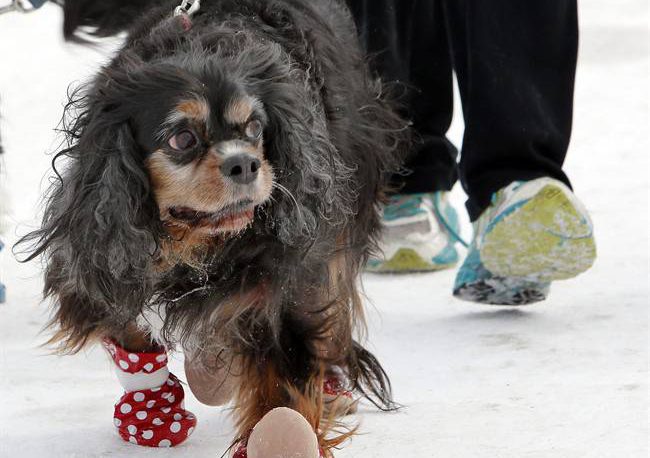With what seems like an exceptionally cold winter, the Montreal SPCA and the DMV Veterinary Centre are urging pet owners to make sure their furry companions stay safe.

Despite their warm fur coats, frostbite and hypothermia are very much a possibility for cats and dogs during Montreal’s colder months.
READ MORE: Montreal hospitals warn parents to be vigilant of frostbite
Just like us, our pets face the same threats when it comes to extreme cold and wind chills.
“We have animals coming in with frostbite almost weekly,” said Gabrielle Carrière, head veterinarian for the SPCA.
But how exactly do our furry friends get frostbite, and what are the signs pet owners can look for?
READ MORE: Here’s what an extreme cold snap looks like in Canada
According to Carrière, signs of frostbite in animals is similar to the signs in humans.
“The body constricts in the peripheral blood vessels in order to keep the core warm,” she explained.
“Once the dead part becomes hard and cold, it will likely fall off.”
Carrière says one of the tell-tale signs of frostbite in pets is hard and cold extremities.

Get breaking National news
READ MORE: Staying safe during extreme cold weather
“We often see frostbite in cats,” she told Global News.
“Mostly on their ears, sometimes on their tails.”
Carrière explained there is also an increased risk for hypothermia in smaller animals, as well as both very old and very young ones.
READ MORE: Recognizing signs of frostbite and the dos and don’ts of treatment
She says the most important thing to remember is to avoid keeping dogs out for long periods of time and to keep cats inside.
WATCH BELOW: Guarding your pets from frostbite
“If it’s too cold for you, it’s most likely too cold for your pets,” Carrière said.
“When the temperature drops, bring your pets inside.”
Carrière notes that some other weather-related injuries to look for are irritated feet, and the unusual, but still possible, “dog licking the pole” situation that could leave them stuck to the cold metal.
READ MORE: Australian’s photos of frostbite injury in Canada goes viral
To help owners keep their pets safe during the harsh season, the SPCA has put out a list of tips of the dos and don’ts of winter care for animals:
- Watch out for antifreeze: Many animals like the smell and taste of antifreeze, but it is highly poisonous and can be deadly, even in very small amounts.
- Clean and treat their paws: Rinse or wipe off their paws after walks, before they have a chance to lick them.
- Put boots on: Boots can protect, not only from the cold but also from rock salt and chemical products used to melt snow.
- Keep their coat healthy and dry: Brush your pet on a regular basis. Consider a sweater or coat if your pet is short haired and do not take your pet outdoors unless their fur is completely dry.
- Limit time outdoors: Your pet’s nose, tail, ears and toes are the most vulnerable to cold temperatures.
- Avoid pools and lakes: Make sure they do not go onto frozen surfaces since they could fall through the ice. Keep your pet on a leash and supervise them at all times.
- Don’t let your animal approach metal poles: Some dogs have a bad habit of licking poles and in the winter their tongue may stick to the cold metal, injuring their tongues.
- Watch out around your car: In the winter, cats and small wild animals are often attracted to the warm engine of parked cars and may crawl under the hood. Bang on the hood or honk the horn to scare them away before starting your engine.
The DMV Veterinary Centre echoed the warning on its automated phone message, reminding callers of the dangers that come with keeping animals out for too long.

Comments